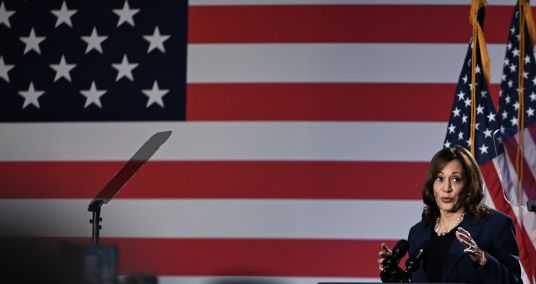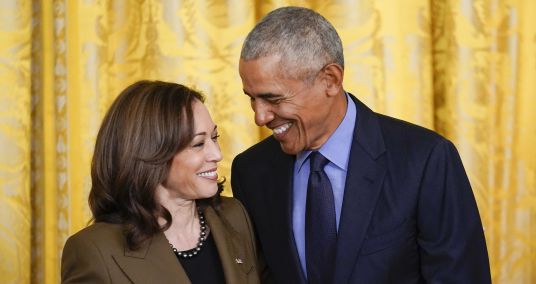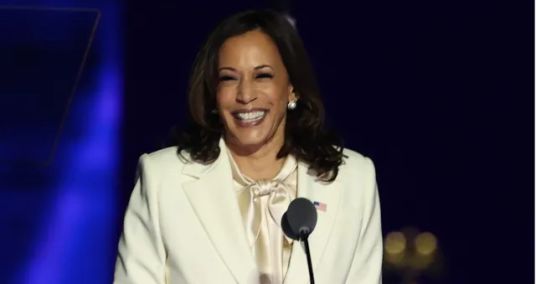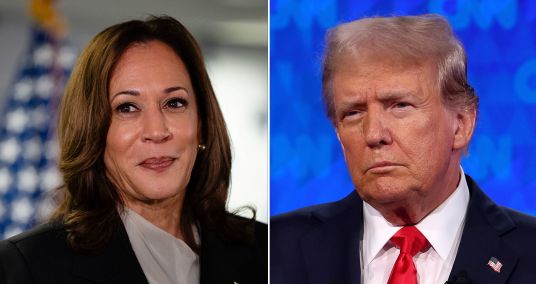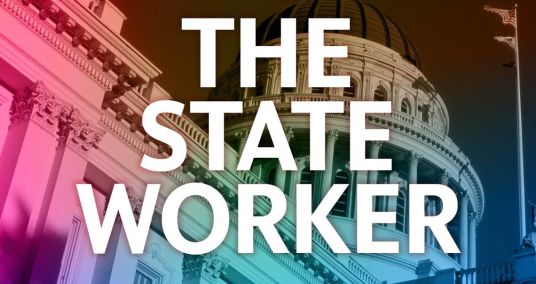Political World
- EntertainmentYahoo TV
2024 Paris Olympics opening ceremony: Celine Dion delivers powerful performance as Olympic cauldron floats into the night sky
The 2024 Paris Olympics marked the first time the parade of nations is taking place outside of a stadium.
1 min read - CelebrityYahoo News
JD Vance calling Kamala Harris a 'childless cat' lady is hitting a nerve. Just ask Jennifer Aniston and Ella Emhoff.
Actress Jennifer Aniston slammed JD Vance's resurfaced comments about "childless cat ladies" — and now they're also striking a nerve with a big part of the electorate: women.
6 min read - NewsThe Yodel
Netanyahu faces pressure on a ceasefire deal, what to expect at the Olympics opening ceremony, Billy Joel ends historic residency
Get caught up on this morning’s news: Olympics opening ceremony, Netanyahu’s U.S. visit continues and more in today’s edition of The Yodel newsletter
4 min read - PoliticsThe New York Times
Major Shifts Beneath the Surface in a New Trump-Harris Poll
After all the political tumult of the last month, Thursday’s latest New York Times/Siena College poll is full of findings unlike any we’ve seen this cycle, with one exception: who leads the presidential race. The poll found Donald Trump ahead of Kamala Harris by 1 percentage point, 48% to 47%, among likely voters. Other than the name of the Democratic candidate, “Trump +1” is a result that could have been from any other Times/Siena poll before President Joe Biden’s disastrous debate. Sign up for
6 min read - PoliticsPolitico
Obamas endorse Harris' presidential bid
The former president and his wife, Michelle, were the two most prominent Democrats not yet behind the vice president as she has all but locked up the party's nomination.
2 min read - ScienceSpace
Mercury has a layer of diamond 10 miles thick, NASA spacecraft finds
Using data from NASA's MESSENGER spacecraft, scientists have determined that the solar system's tiniest planet, Mercury, hides a not-so-tiny secret: a 10-mile-thick mantle of diamond.
6 min read - PoliticsCOMINGSOON.net
Did Kamala Harris Drop out of the Race? Is She Still Running for President?
With President Joe Biden stepping out of the 2024 presidential race, all eyes are now on Vice President Kamala Harris. As she receives endorsements from major Democratic figures and gears up for her campaign, there’s a growing curiosity among the public about her status. The key question on everyone’s mind is: Did Kamala Harris drop […] The post Did Kamala Harris Drop out of the Race? Is She Still Running for President? appeared first on ComingSoon.net - Movie Trailers, TV & Streaming News, and
2 min read - SportsMiami Herald
E1 electric powerboat racing league to bring race to Miami in November 2025
The E1 electric powerboat racing series is hoping to bring attention to electric motorsports and sustainability efforts.
4 min read - ScienceBusiness Insider
NASA just scored a badly needed win: The best potential evidence of alien life yet
The Perseverance rover found potential evidence of life on Mars. Three features make the rock promising, but NASA must bring it to Earth to study it.
5 min read - BusinessBusiness Insider
Why the Fed won't cut rates until December, according to Bank of America
"We think the Fed can be patient," Bank of America economists wrote in new research.
2 min read - BusinessBusiness Insider
Your company's AI spending spree could cost you your job
Huge AI investments are costing some workers their jobs as companies change their spending priorities.
5 min read - EntertainmentSalon
"She's a vocal athlete": Celine Dion opens the Olympics with a stunning Eiffel Tower performance
The singer closed out an Opening Ceremony that included Lady Gaga, a mystery figure, Marie Antoinette and more
7 min read - EntertainmentSalon
"So metal": Headless Marie Antoinette steals the show at Paris Olympics opening ceremony
Olympic opening ceremony director, Thomas Jolly, wanted to “challenge” French cliché in the opening and he sure did
1 min read - USKTLA articles
Long Beach men used upholstery shop as front, hid drugs in vending machine: DOJ
Two men from Long Beach were arrested by federal agents Friday morning on an 11-count indictment accusing them of selling fentanyl and methamphetamine out of a Gardena upholstery shop. Hector Valle, 48, and Efren Sanchez, 52, were expected to be arraigned Friday afternoon in United States District Court in downtown Los Angeles, according to the […]
2 min read - PoliticsFox News
Ramaswamy warns GOP on several 'hard realities' to address before criticizing Harris: 'Hurting our chances'
Vivek Ramaswamy says Republicans are making a mistake if they focus on some of the criticisms they have launched since Vice President Kamala Harris became the presumptive Democratic nominee for president.
7 min read - EntertainmentINSIDER
22 details you might've missed during the Paris 2024 opening ceremony
As with every olympics, Paris 2024 kicked off with a lively opening ceremony and the parade of nations as athletes make their way into the arena.
8 min read - USSacramento Bee
Yolo criminal grand jury indicts two Pennsylvania men accused in 2021 Woodland murder
The indictment moves the Yolo County murder case straight to trial.
2 min read - EntertainmentKTLA articles
Music Fest Fridays: Kimberly Perry performs ‘If I Die Young Pt. 2’
Kimberly Perry, known as one-third of the Grammy-nominated trio The Band Perry is now paving her own lane in country music as a solo artist. She joined us live from Greeneville, Tennessee as she prepares to hit the road for her headline tour. And just for Music Fest Fridays, Perry shared a special performance of, […]
1 min read - OpinionThe New Republic
J.D. Vance Pathetically Tries to Defend “Childless Cat Ladies” Insult
He told Megyn Kelly that it was “a sarcastic comment.” Then he doubled down.
3 min read - PoliticsFox News
Buttigieg ripped for 'extraordinarily brazen' slam on Trump that critics say was accidental 'dunk' on Biden
Transportation Secretary Pete Buttigieg's slam on former President Trump over presidential debates was mocked by conservatives on social media Friday.
2 min read - USFox News
Harvey Weinstein hospitalized in NYC with COVID-19 and double pneumonia
Disgraced movie mogul Harvey Weinstein has been hospitalized at New York's Bellevue Hospital Prison Ward after testing positive for COVID-19 and contracting double pneumonia, according to his representative.
3 min read - PoliticsFox News
Fox News Poll: Dead heat between Harris and Trump in Michigan
Former President Donald Trump and Vice President Kamala Harris are tied in Michigan, according to a new Fox News poll conducted after Biden dropped out of the race.
6 min read - LifestyleThe Cool Down
Gardening expert shares easy seed-saving hack to grow endless amounts of super-plant: 'If you're not growing ... you need to be'
"I grow as much Nasturtium as I can."
2 min read - PoliticsINSIDER
Doug Emhoff blasts JD Vance's 'stupid, uninformed' comments about Kamala Harris being a 'childless' cat lady: 'It hurt my feelings'
Since they married in 2014, Vice President Kamala Harris and second gentleman Doug Emhoff have co-parented Emhoff's two children with his ex-wife.
4 min read - USFox News
‘Huge win for the world’: US celebrates as Sinaloa cartel leaders are arrested
U.S. leaders and lawmakers are reacting with joy after the arrest of two Sinaloa cartel leaders this week, putting a dent in the ambitions of a top drug cartel.
3 min read - BusinessBusiness Insider
Stock market today: Indexes rebound as inflation data reinforces Fed rate-cut bets
June's PCE inflation data came in line with expectations, and showed inflation modetaing at a 2.6% rise year-to-year.
3 min read - USKTLA articles
Man, 64, admits to ‘catfishing’ girl on Roblox, convincing her to send explicit images
A 64-year-old man from Riverside County has admitted to posing as a 13-year-old boy online and convincing a young girl to send him sexually explicit photos of herself and a young relative. On Friday, the United States Department of Justice announced that John Mathew Piecuch, 64, of Hemet pleaded guilty to one count of production […]
2 min read - USFox News
Justin Timberlake's lawyer claims police made 'significant errors' during star's DWI arrest
Justin Timberlake's attorney, Ed Burke, told Fox News Digital on Friday that the singer was "not intoxicated" at the time of his DWI arrest on June 18.
3 min read - USSacramento Bee
Caltrans sues former supervisor who sexually harassed employee, seeking damages repayment
Caltrans paid an employee more than a quarter of a million dollars after a jury found the transportation agency failed to stop a former supervisor’s sexual harassment.
3 min read - PoliticsINSIDER
Dave Portnoy says JD Vance 'sounds like a moron'
Portnoy said Vance's idea of taxing childless adults more than parents was "idiotic," questioning whether the Ohio senator is a Republican.
3 min read - USKTLA articles
Man sets own truck ablaze while trying to evade deputies, damaging multiple vehicles
A Bloomington man is behind bars after he intentionally set fire to his truck on Thursday, causing it to explode and damage other vehicles, while attempting to elude the San Bernardino County Sheriff’s Department. Rolando Guillen Ochoa, 58, allegedly intentionally rammed a maintenance golf cart several times at Cedar Village Mobile Home Park, in the […]
2 min read - PoliticsFox News
Bernie Sanders says Trump's 'lying' when he claims Kamala Harris is more liberal than the Vermont senator
Progressive champion Sen. Bernie Sanders of Vermont takes aim at former President Trump and gives Vice President Kamala Harris advice as he campaigns on behalf of her and Democrats in swing state New Hampshire.
6 min read - USMiami Herald
Trial date set in criminal corruption case against suspended Miami commissioner
The trial of Alex Díaz de la Portilla has been scheduled.
2 min read - USFox News
NYC investigating ‘extremely dangerous’ migrants that might be connected to Brooklyn shelter, police shootings
Brooklyn residents rallied to the streets to urge local officials to shut down migrant shelters amid increasing violence and crime after two shootings over the weekend.
3 min read - PoliticsFox News
Kamala Harris and the southern border crisis: A timeline
Vice President Kamala Harris was assigned a role that Republicans have called the "border czar," but it's a title the White House and her campaign have rejected.
7 min read - SportsMiami Herald
Dolphins Stock Report (Day 3): Tua and Tyreek light Dolphins defense up
Tua Tagovailoa looked sharp in his first unlimited day of participation in the Dolphins training camp practice
4 min read - BusinessSacramento Bee
Large wine conglomerate is going bankrupt. What does it mean for its 10 California wineries?
The Santa Rosa-based company has been showing signs of struggle for months.
3 min read - OpinionMiami Herald
Tackling the mental health stigma in Miami-Dade’s Black and brown communities | Opinion
Far too many minorities avoid seeking help for fear that admitting to a mental health issue might be seen as a sign of weakness | Opinion
3 min read - USKTLA articles
‘Victoria Fire’ in Acton threatens homes, burns cars
A brush fire in Acton has burned about 10 acres and threatened homes on Friday, according to authorities. Dubbed the “Victoria Fire,” it was reported around 11 a.m. near the 14 Freeway, north of Escondido Canyon. Forward progress on the fire was halted Friday afternoon, according to officials. Footage captured from Sky5 showed flames engulfing […]
- LifestyleSacramento Bee
Macy’s signs spotted at Elk Grove shopping center. When will the department store open?
“The community has been definitely excited, peeking in.”
3 min read - USSacramento Bee
Explosion destroys mailbox in north Sacramento County; pieces of explosive device found
The explosion was reported Thursday night in the residential neighborhood near Antelope.
1 min read - OpinionThe New Republic
Far-Right Nutjob Laura Loomer Spews Hideous Lies About Gabby Giffords
The failed politician viciously attacked the gun violence survivor, who is married to Senator Mark Kelly, a rumored candidate to be Kamala Harris’s running mate.
1 min read - PoliticsFox News
Trump announces plan to hold rally in Pennsylvania town of failed assassination attempt
Former President Trump on Friday said he plans to re-visit the town where he was shot earlier this month at a campaign rally.
2 min read - PoliticsFox News
Trump impeachment Dem pushes back on GOP concerns over possible role in assassination attempt probe
Republicans are criticizing Rep. Dan Goldman's potential role on the bipartisan task force to investigate the assassination attempt against former President Trump.
3 min read - EntertainmentSalon
JD Vance refers to Jan. 6 "QAnon Shaman" as "a fun guy to have a beer with," in resurfaced video
A clip of Vance at an event in 2023 shows him speaking favorably of one of the Capitol riot poster boys
2 min read - SportsMiami Herald
Cote: Dolphins paying Tua to be elite with $212 million extension. Now he must win like he is | Opinion
The Miami Dolphins’ team-record four-year, $212 million contract extension puts Tua Tagovailoa in elite-quarterback territory. He must do more than play like he is. He must win like he is.
2 min read - BusinessMiami Herald
Deli meat sold at Publix, Milam’s and other food counters recalled in listeria outbreak
What to know about the health concern in South Florida.
6 min read - OpinionThe New Republic
J.D. Vance Has Bonkers Response to the QAnon Shaman
Vance is echoing Donald Trump’s stance that January 6 rioters are being unfairly treated.
1 min read
